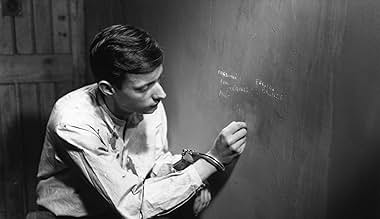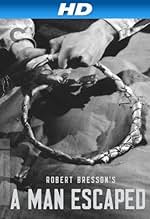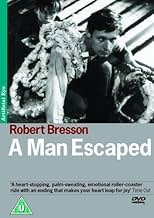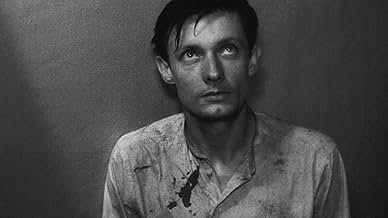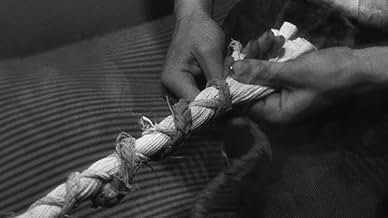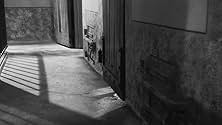Ein zum Tode Verurteilter ist entflohen
Originaltitel: Un condamné à mort s'est échappé ou Le vent souffle où il veut
IMDb-BEWERTUNG
8,2/10
29.723
IHRE BEWERTUNG
Einem Offizier des Widerstandes gegen ein Regime der Unterdrückung gelingt es nach wochenlanger Anspannung, aus einem als ausbruchssicher geltenden Gefängnis zu entkommen.Einem Offizier des Widerstandes gegen ein Regime der Unterdrückung gelingt es nach wochenlanger Anspannung, aus einem als ausbruchssicher geltenden Gefängnis zu entkommen.Einem Offizier des Widerstandes gegen ein Regime der Unterdrückung gelingt es nach wochenlanger Anspannung, aus einem als ausbruchssicher geltenden Gefängnis zu entkommen.
- Nominiert für 1 BAFTA Award
- 4 Gewinne & 3 Nominierungen insgesamt
César Gattegno
- Le prisonnier X
- (Nicht genannt)
Max Schoendorff
- Un soldat allemand
- (Nicht genannt)
Zusammenfassung
Reviewers say 'A Man Escaped' is lauded for its minimalist style and intense focus on escape from a Nazi prison. Bresson's direction, sparse dialogue, and use of non-professional actors are praised. The deliberate pacing builds suspense and immerses viewers. Some appreciate its authenticity, while others find it less engaging. Leterrien's performance is noted for realism, but opinions vary on its accessibility and emotional impact.
Empfohlene Bewertungen
Though the title seems to ruin the ending, the movie isn't boring for a moment. Suspense to the end. Marvelous filmmaking. The movie follows slowly and quietly the day of the prisoner who's to be executed and plans an escape. I don't know what else to say. You have to watch this. 32 of the 46 voters gave it a 10! Genius. They don't make movies like this often. Must See for movie lovers and all.
10allyjack
Was there ever a sparer, more concentrated film? The painstaking focus on the ritual-like preparation for the escape is almost wrenching in its calm severity; yet always graceful, always fluid. The details of the final escape make for one of the most memorable sequences in cinema - interspersed with episodes of doubt in which he falters for hours or more before taking the next step, just as he delays the escape itself for many days even though he knows his execution is imminent. It's almost like a sombre dance with death, or at least a morally exacting examination of one's limits and a fear of the transcendent (which in this case is represented merely by freedom itself). There are no moments of light relief or variation here, just an attention to process and causality - the concentration on the plan almost becomes a means of redemption, until carrying out the plan becomes almost superfluous if not destructive. Of all Bresson's films, this is the one that best engages on a thematic level while simultaneously working as narrative - his distilled gravity constitutes a fantastically effective suspense mechanism; a model of tight storytelling.
I hit an impasse with Bresson's previous film, Diary; he used a peculiar conflation of a search for transparent truth in the mysteries of life with anguish and dejection as romanticized spiritual journey, romanticized in the Christian sense where it's not spiritual if it doesn't have anguish. It seemed crude and without enlightenment.
The impasse was; was the pious young priest for Bresson another person among others in the village led astray in the effort to rationalize his emotions, or was he above them, an ideal to aspire to? This was more interesting to me than the film itself.
So I came to this hoping for the fresh light of retrospect. And what a stark contrast this is! Another idealistic young man who suffers torments, physical and inner, another life of anguish in four walls. But here Bresson draws the breath in, quiets the anguish, accepts the fact of it, and works to concentrate the senses and create physical presence. We've come far in our ability to do this, but it still resonates.
The film is practically a long suspense piece, with a few questions about ethics suspended briefly. The man here, by contrast to the priest, simply does the work he sets out before him. He doesn't perceive himself a martyr of his cause, or a quiet sufferer of wrongs, he simply abides and prepares for the long night. His idealism waits to be found out until near the end when the charges against him are laid out; sabotage.
It's fine work, easy to parse. It doesn't answer the impasse mentioned above so for that I'll have to go to his next one.
The impasse was; was the pious young priest for Bresson another person among others in the village led astray in the effort to rationalize his emotions, or was he above them, an ideal to aspire to? This was more interesting to me than the film itself.
So I came to this hoping for the fresh light of retrospect. And what a stark contrast this is! Another idealistic young man who suffers torments, physical and inner, another life of anguish in four walls. But here Bresson draws the breath in, quiets the anguish, accepts the fact of it, and works to concentrate the senses and create physical presence. We've come far in our ability to do this, but it still resonates.
The film is practically a long suspense piece, with a few questions about ethics suspended briefly. The man here, by contrast to the priest, simply does the work he sets out before him. He doesn't perceive himself a martyr of his cause, or a quiet sufferer of wrongs, he simply abides and prepares for the long night. His idealism waits to be found out until near the end when the charges against him are laid out; sabotage.
It's fine work, easy to parse. It doesn't answer the impasse mentioned above so for that I'll have to go to his next one.
10niezone
What makes a movie great? Sometimes we find it in an actor's performance, sometimes it lies in the plot, maybe is the suspense, or amazing action scenes. "A Man Escaped", a movie by acclaimed director Robert Bresson delivers none of those elements we usually associate with great films. However, the expertise and craftsmanship of Bresson makes for an unparalleled experience, full of non-stop suspense that keeps you at the edge of your seat, captivated by every action and every move. In fact, this is one of the first times in recent memory when I don't end up checking my watch, or looking around, or even exchanging a couple of words with my company. "A Man Escaped" simply doesn't allow you to catch your breath. Bresson is known for his very distinct style, in which his interest goes beyond performances or strong plots, but rather relies on the character of his scenes, in the way he builds each and every take to make you build the environment for yourself. Bresson is the mastermind behind the term "suggestive" cinema. He shows you just enough for you to build the scene on your own and it is such a subtle directing skill, that you don't realize unless you carefully study the art of his direction. Bresson submerges us in a prisoner's routine, inside a process of patience and conviction that eventually pays off. Bresson goes as far as to show us the result of the movie in its very title, fully confident that even when you know what will happen at the end, there is no way you won't feel the increasing tension, and electrifying suspense that starts from the very first scenes. At the end, it is a movie about patience, about the intellect of a prisoner whose will and desire to escape a prison portrays the strengths of the human spirit. However, the movie does not have uplifting phrases that often fall into clichés. This, ladies and gentleman, is what cinema can do for us. Less is more.
This movie, perhaps above all others, exemplifies just how important sound is in cinema. In fact, sounds (excluding dialogue) help carry the plot as much as the visuals and dialogue.
The crunching of the gravel under their feet really creates a sense of realism to the story. If you or I were escaping from prison, all the sounds Fontaine must pay attention to we must as well.
I doubt you'll find this film at your local video store, but I encourage everyone to check it out. It's like the Shawshank of the 1950s.
The crunching of the gravel under their feet really creates a sense of realism to the story. If you or I were escaping from prison, all the sounds Fontaine must pay attention to we must as well.
I doubt you'll find this film at your local video store, but I encourage everyone to check it out. It's like the Shawshank of the 1950s.
Wusstest du schon
- WissenswertesAfter seeing the film, Jean-Luc Godard said that Robert Bresson was "to French cinema what Wolfgang Amadeus Mozart is to German music and Fyodor Dostoevsky is to Russian literature".
- Zitate
Le lieutenant Fontaine: I think my courage abandoned me for a moment and I cried.
- Alternative VersionenAfter the "Fin" title card, there is a version that plays music to a black screen, while another version displays "Exit Music" in white letters against the black screen.
- VerbindungenFeatured in De weg naar Bresson (1984)
- SoundtracksGreat Mass in C Minor, No.16 (K.427) - Kyrie
Written by Wolfgang Amadeus Mozart
Top-Auswahl
Melde dich zum Bewerten an und greife auf die Watchlist für personalisierte Empfehlungen zu.
- How long is A Man Escaped?Powered by Alexa
Details
- Erscheinungsdatum
- Herkunftsland
- Sprachen
- Auch bekannt als
- A Man Escaped
- Drehorte
- Produktionsfirmen
- Weitere beteiligte Unternehmen bei IMDbPro anzeigen
- Laufzeit
- 1 Std. 41 Min.(101 min)
- Farbe
- Seitenverhältnis
- 1.37 : 1
Zu dieser Seite beitragen
Bearbeitung vorschlagen oder fehlenden Inhalt hinzufügen


